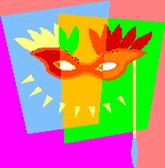|
 
| |

Carnival
is the period which precedes the Quaresima (Lent).
The
beginning day can change, but the celebrations take place in the days before
Mercoledì delle Ceneri (Ash Wednesday) i.e. from Thursday to Tuesday (Shrove
Tuesday).
Carnival is a feast for many parts of the world. In
Italy
the most famous are those celebrated in
Venice
,
Viareggio
, Ivrea and Sanremo.
Carnival is represented by a man in the street or by a puppet, this is made with
straw and grass and surrounded of banger, and finally he is burnt at a stake in
doing so, the evil Lent disappears.
In the various Italian regions, Carnival had different names. In
Sicily
it was called “NANNU”.
Today, this period is dedicated to
amusement and to masked parties, called “Veglione di Carnevale” (Carnival
Party). Men, women and children disguised by cartoon personages, princess,
riders, mad scientists…The children during the party amuse themselves by
pulling themselves confetti and falling stars and coloured bubbles.
But the most important Carnevalesque figures are: Harlequin (a Venetian masque
of the 500s) and Punch(a Neapolitan masque). The legend tells that Harlequin was
an ignorant and buffoon servant but had lots of astuteness. The Harlequin’s
mum didn’t have much money so she sowed him a cloth with different pieces of
coloured cloth. In fact, the Harlequin’s masque is represented by a cloth with
a lot of patches.
Punch instead, is a Neapolitan usher with a hooked nose and a double hump, who
represents the lazy and cunning common person, but wise.
He wears a long, white work-shirt, a white cone-shaped cap and a small black
masque.
The typical carnival sweet in
Sicily
is “LA CHIACCHERA”, made of pastry strips rolled up like ribbons, they are
fried and dusted with vanilla sugar.
However, Carnival is a feast which puts grown-ups, children and teenagers
together because with a masque on their faces, everybody is identical. Carnival
means having a good time, amusements, in the Carnival period there are no
prohibitions.
In
fact: “WHEN IT’S CARNIVAL TIME,ANYTHING GOES!”
Corso
L
|